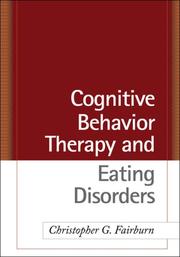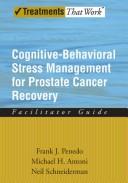| Listing 1 - 10 of 15 | << page >> |
Sort by
|
Periodical
ISSN: 19371217 Year: 2008 Publisher: New York, N.Y. : Guilford Publications
Abstract | Keywords | Export | Availability | Bookmark
 Loading...
Loading...Choose an application
- Reference Manager
- EndNote
- RefWorks (Direct export to RefWorks)
Cognitive therapy --- Cognitive therapy. --- Cognitive-behavior therapy --- Cognitive-behavioral therapy --- Cognitive psychotherapy --- Psychotherapy --- Thérapie cognitive

ISBN: 0190242000 1281342335 9786611342333 0199712069 1435633423 9780199712069 9781435633421 9780195341638 0195341635 0190450959 Year: 2008 Publisher: Oxford ; New York : Oxford University Press,
Abstract | Keywords | Export | Availability | Bookmark
 Loading...
Loading...Choose an application
- Reference Manager
- EndNote
- RefWorks (Direct export to RefWorks)
Individuals with serious and incurable illnesses often require care that goes beyond the body. As they face the challenges of living with and eventually dying from their conditions, they may need to acquire new skills to cope and increase their quality of life. Even those at the beginning of the end of life can take an active role in their treatment. This skill-based program emphasizes flexibility and should be tailored to individual clients. The first module introduces stress management techniques, including cognitive restructuring, relaxation, and problem-focused and emotion-focused coping.
Chronic diseases --- Terminal care --- Cognitive therapy. --- Cognitive-behavior therapy --- Cognitive-behavioral therapy --- Cognitive psychotherapy --- Psychotherapy --- Chronically ill --- Psychological aspects. --- Psychology

ISBN: 0190242140 0199712050 9780190242145 9780199712052 9780195341645 0195341643 Year: 2008 Publisher: Oxford, [England] ; New York, New York : Oxford University Press,
Abstract | Keywords | Export | Availability | Bookmark
 Loading...
Loading...Choose an application
- Reference Manager
- EndNote
- RefWorks (Direct export to RefWorks)
Having a serious illness can be incredibly difficult, especially when there is no cure. As your disease progresses, not only your physical health, but your entire well-being may be affected. Unfortunately, most of your medical care may only treat your body. However, there are things that you and your health care team can do to help you feel better as a whole person. This collaborative, skill-based program will teach you practical techniques to help you cope with your illness and the stress of everyday life. You will learn strategies to improve your mood and deal with feelings of anxiety, depre
Chronic diseases --- Terminal care --- Cognitive therapy. --- Cognitive-behavior therapy --- Cognitive-behavioral therapy --- Cognitive psychotherapy --- Psychotherapy --- Chronically ill --- Psychological aspects. --- Psychology

ISBN: 1593857098 9781593857097 Year: 2008 Publisher: New York The Guilford Press
Abstract | Keywords | Export | Availability | Bookmark
 Loading...
Loading...Choose an application
- Reference Manager
- EndNote
- RefWorks (Direct export to RefWorks)
Cognitive Therapy. --- Cognitive therapy. --- Eating Disorders --- Eating disorders --- therapy. --- Treatment. --- Cognitive therapy --- Cognitive-behavior therapy --- Cognitive-behavioral therapy --- Cognitive psychotherapy --- Psychotherapy --- Treatment
Book
ISBN: 0190242086 1281868329 9786611868321 0199711410 9780199711413 9780195342901 0190451084 Year: 2008 Publisher: Oxford ; New York : University Press,
Abstract | Keywords | Export | Availability | Bookmark
 Loading...
Loading...Choose an application
- Reference Manager
- EndNote
- RefWorks (Direct export to RefWorks)
Early stage breast cancer can be stressful and upsetting for both the woman dealing with the disease and her partner. This illness can also place a strain on a couple's relationship. However, couples who are able to provide effective support to one another are more likely to adapt well. Focusing on the couple as a unit can promote effective coping for both patients and their partners . This couples-focused group program aims to improve a couple's functioning as a ""team"" and provides a supportive environment for couples facing similar breast cancer-related issues. Over the course of six sessi
Breast --- Cognitive therapy. --- Marital psychotherapy. --- Marital therapy --- Marriage psychotherapy --- Family psychotherapy --- Couples therapy --- Marriage counseling --- Cognitive-behavior therapy --- Cognitive-behavioral therapy --- Cognitive psychotherapy --- Psychotherapy --- Cancer --- Psychological aspects.

ISBN: 0199887845 0190242167 1281868353 9786611868352 0199710821 9780199710829 6611868356 0195365895 9780195365894 9780199887842 9780190242169 9781281868350 Year: 2008 Publisher: Oxford ; New York : Oxford University Press,
Abstract | Keywords | Export | Availability | Bookmark
 Loading...
Loading...Choose an application
- Reference Manager
- EndNote
- RefWorks (Direct export to RefWorks)
It is estimated that one in ten U.S. adults suffers from chronic insomnia. If left untreated, chronic insomnia reduces quality of life and increases risk for psychiatric and medical disease, especially depression and anxiety. There are two forms of insomnia: secondary insomnia, in which it is comorbid with another condition such as psychiatric disorders, chronic pain conditions, or cardiopulmonary disorders, and primary insomnia, which does not coexist with any other disorder, Though insomnia may be caused by any number of things, it is primarily sustained by the development of poor sleep habi
Insomnia --- Cognitive therapy. --- Cognitive-behavior therapy --- Cognitive-behavioral therapy --- Cognitive psychotherapy --- Psychotherapy --- Abnormal wakefulness --- Sleeplessness --- Sleep deprivation --- Sleep disorders --- Wakefulness --- Treatment
Book
ISBN: 0190242094 1281868337 9786611868338 0199711402 9780199711406 0195342917 Year: 2008 Publisher: New York Oxford Oxford Univ. Press
Abstract | Keywords | Export | Availability | Bookmark
 Loading...
Loading...Choose an application
- Reference Manager
- EndNote
- RefWorks (Direct export to RefWorks)
As a couple coping with early stage breast cancer, it is important that you face the stresses and challenges together. To support each other during this difficult time, you and your partner may benefit from enhancing your relationship and stress management skills. This six-week, couples-focused group program will help you and your partner become an effective coping "team." Use this workbook in conjunction with group therapy to strengthen your relationship, and learn how to better support and communicate with one another. Also learn to strengthen emotional intimacy by taking the time to discover each other's needs and engaging in "wish list" activities to bring you closer together. Relaxation techniques help you and your partner manage stress so you are better able to deal with the challenges of cancer. The group format provides a supportive environment and gives you a chance to learn from other couples dealing with similar issues.
Breast --- Cognitive therapy. --- Marital psychotherapy. --- Marital therapy --- Marriage psychotherapy --- Family psychotherapy --- Couples therapy --- Marriage counseling --- Cognitive-behavior therapy --- Cognitive-behavioral therapy --- Cognitive psychotherapy --- Psychotherapy --- Cancer --- Psychological aspects.
Book
ISBN: 0190242175 1281868361 9786611868369 0199710813 9780199710812 0195365909 9780190242176 9781281868367 6611868364 Year: 2008 Publisher: Oxford ; New York : Oxford University Press,
Abstract | Keywords | Export | Availability | Bookmark
 Loading...
Loading...Choose an application
- Reference Manager
- EndNote
- RefWorks (Direct export to RefWorks)
It is estimated that one in ten U.S. adults suffers from chronic insomnia. If left untreated, chronic insomnia reduces quality of life and increases risk for psychiatric and medical disease, especially depression and anxiety. There are two forms of insomnia: secondary insomnia, in which it is comorbid with another condition such as psychiatric disorders, chronic pain conditions, or cardiopulmonary disorders, and primary insomnia, which does not coexist with any other disorder, Though insomnia may be caused by any number of things, it is primarily sustained by the development of poor sleep habi
Insomnia --- Cognitive therapy. --- Cognitive-behavior therapy --- Cognitive-behavioral therapy --- Cognitive psychotherapy --- Psychotherapy --- Abnormal wakefulness --- Sleeplessness --- Sleep deprivation --- Sleep disorders --- Wakefulness --- Treatment

ISBN: 0750688009 0702032956 9780702032950 9780750688000 Year: 2008 Publisher: Edinburgh, [Scotland] : Butterworth-Heinemann,
Abstract | Keywords | Export | Availability | Bookmark
 Loading...
Loading...Choose an application
- Reference Manager
- EndNote
- RefWorks (Direct export to RefWorks)
Cognitive therapy. --- Occupational therapy --- Activity programs, Therapeutic effect of --- Occupation therapy --- Work, Therapeutic effect of --- Medical rehabilitation --- Physical therapy --- Psychotherapy --- Therapeutics, Physiological --- Cognitive-behavior therapy --- Cognitive-behavioral therapy --- Cognitive psychotherapy

ISBN: 0190242035 1281529303 9786611529307 0199714231 9780199714230 9781281529305 6611529306 0195336976 9780195336979 019045069X Year: 2008 Publisher: Oxford ; New York : Oxford University Press,
Abstract | Keywords | Export | Availability | Bookmark
 Loading...
Loading...Choose an application
- Reference Manager
- EndNote
- RefWorks (Direct export to RefWorks)
Men treated for localized prostate cancer have an excellent medical prognosis, but may have difficulty readjusting to life after surgery as a result of treatment related side effects. Changes in physical functioning and ongoing PSA monitoring due to the possibility of recurrence may bring added stress. Effective stress management is a key factor in increasing quality of life in this population and may play a role in maintaining overall health. Cognitive Behavioral Stress Management (CBSM) and relaxation training constitute the two components of this comprehensive program. Each session provides
Prostate --- Stress management. --- Cognitive therapy. --- Relaxation. --- Health --- Hygiene --- Mental health --- Rest --- Cognitive-behavior therapy --- Cognitive-behavioral therapy --- Cognitive psychotherapy --- Psychotherapy --- Management, Stress --- Gland, Prostate --- Glandula prostata --- Prostata --- Prostate gland --- Exocrine glands --- Generative organs, Male --- Cancer --- Patients --- Rehabilitation. --- Psychological aspects.
| Listing 1 - 10 of 15 | << page >> |
Sort by
|

 Search
Search Feedback
Feedback About UniCat
About UniCat  Help
Help News
News